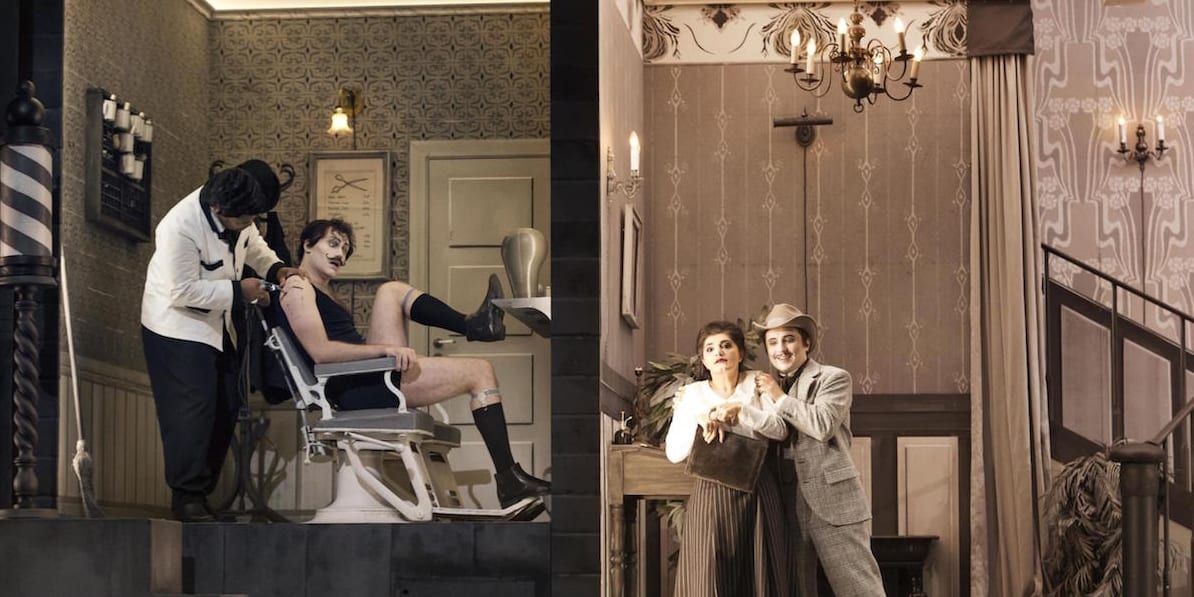When I first spotted “Il Barbiere Di Saviglia” on the yearly programme of the Israeli Opera, my immediate reaction was: what a challenge it is for a director to reinvent an opera hit, time and again! But director Martin Lyngbo and the Royal Danish Opera stood to the challenge in an admirable way by creating a most enjoyable production loaded with inventions and creativity.
To the original Commedia dell’arte, Lingbo added a new layer of it, styled as a silent film of the early 20th century: funny slapstick scenes, an accompanying piano on the stage, black-and-white designs, and endless moving comic scenes. Even the Hebrew subtitles, usually screened above the stage and on the two sides, were projected this time directly onto the props and in different spots. (I must admit: it was not that convenient for the readers of the English subtitles, which remained in one location way above the stage at a most inconvenient angle.)
Rossini was well known for being very productive, completing an average of two operas per year for almost 20 years, and in some years writing as many as four. Musicologists believe that the music for “Il Barbiere di Siviglia” was composed in just under three weeks, although the famous overture was actually recycled from two of his earlier operas. To the listeners of today, it is hard to believe that the premiere at the Teatro Argentina in Rome in February 1816 was a disaster. The audience hissed and jeered throughout, mainly because many of them were supporters of one of Rossini’s rivals, Giovanni Paisiello, who had already composed “Il Barbiere di Siviglia.” The second performance, however, was successful.
The plot is well known. Lindoro, a young Count Almaviva in disguise, hopes to make the beautiful Rosina love him. Rosina is the young ward of the grumpy, elderly Dr. Bartolo, who plans to marry her once she is of age. Since Figaro, the barber, used to be a servant of the Count, the Count asks him for assistance in helping him meet Rosina, offering him money should he be successful. Knowing the Count only as Lindoro, Rosina falls in love with him. Through endless maneuvers Figaro accomplishes his mission and Almaviva and Rosina get married. Happy end.
Fulfilling the director’s vision meant casting singers with comic acting skills as well as adequate voices. Again, not an easy challenge, but fully met. All leading roles, most of them making their debut in Tel-Aviv, were a pleasure to listen to and to watch.
First and foremost: the Russian mezzo soprano Aigul Akhmetshina. Her voice, her movement and her looks were all highly enjoyable. I look forward to listening to her again next month with Yevgeni Onegin on the same stage. American tenor Aaron Blake was a perfect Count Almaviva, a comic actor by nature. Luciano di Pasquale, the Italian baritone, was a convincing grumpy Dr. Bartolo; I really got to hate him. And above all, the charismatic Figaro: American baritone Jonathan Michie. A rare collection of a top quality cast.
Conductor Alessandro de Marchi also made his Israel Opera debut and led the orchestra to a very lively performance, thereby matching the overall concept of the director and spirit of the production.
- The opera is sung in Italian with English and Hebrew subtitles

